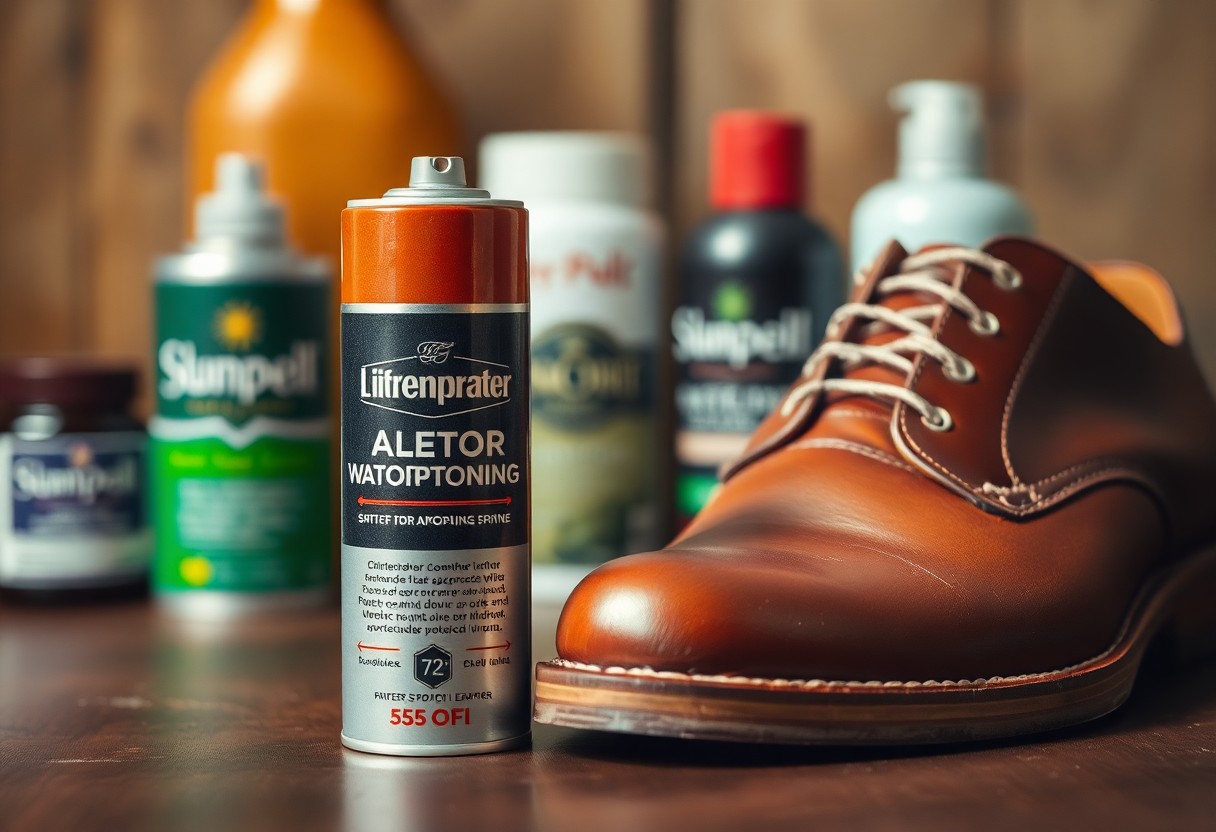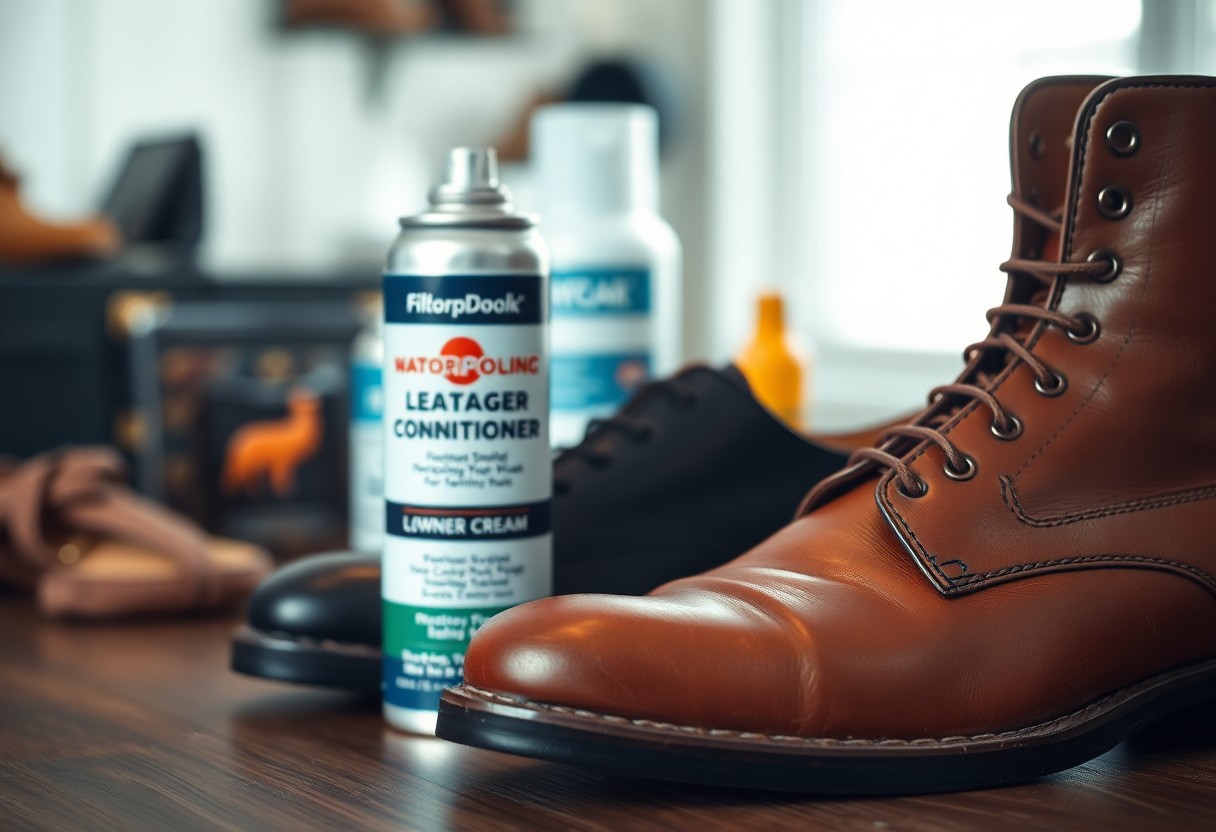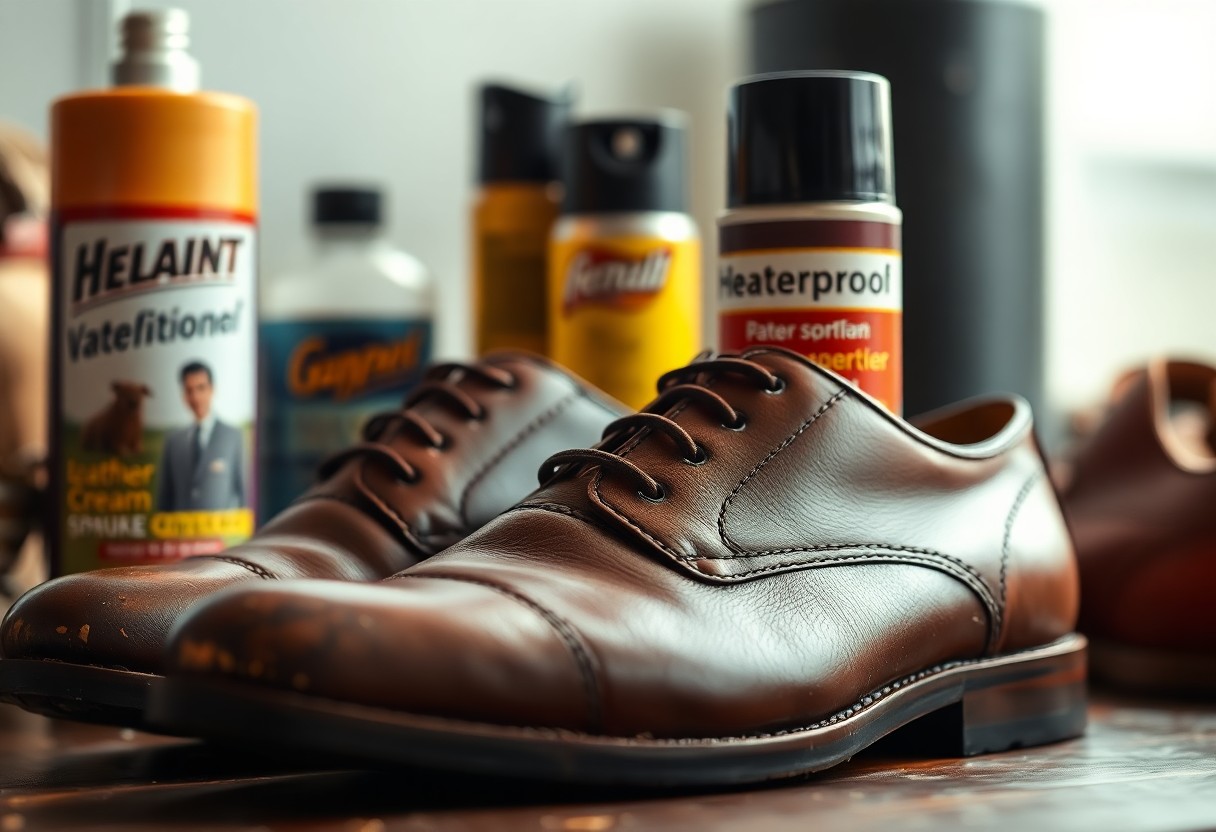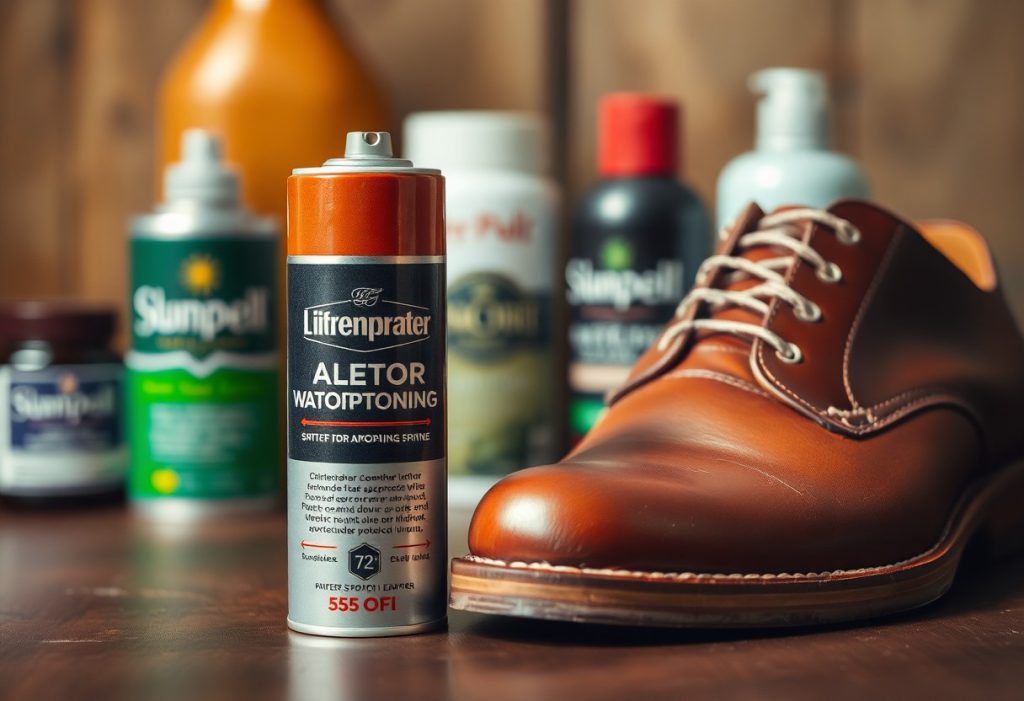Mistakes in leather care can cause permanent damage to your valuable shoes. One of the most common errors is applying waterproofing spray to smooth leather surfaces. While these sprays seem like a simple way to protect your footwear, they can block essential nutrients from penetrating the leather, potentially leading to dryness and cracking over time. Smooth leather is naturally water-resistant due to its grain structure, and it requires proper nourishment using shoe creams and waxes to maintain durability. Instead of opting for sprays, choose high-quality leather conditioners and wax polishes that both protect and nourish the leather, ensuring longevity while retaining its natural qualities.
Essential Strategies for Effective Leather Protection
To maximize the lifespan of your leather items, understanding their protective qualities is vital. Full grain leather naturally features water-resistant properties stemming from its tightly woven fiber structure. However, these protective qualities need regular maintenance to remain effective. The overall durability of your leather is significantly influenced by the care it receives. Using waterproofing sprays can restrict the leather’s natural ability to breathe, resulting in severe damage over time if not managed correctly.
Discovering the Unique Benefits of Full Grain Leather
After undergoing the tanning process, full grain leather maintains its original surface layer, which provides remarkable natural protection. Items made from this leather type benefit from an intact grain layer that offers significant resistance against water and wear. This outer layer is enriched with natural oils and fibers, forming a protective barrier that renders additional waterproofing sprays unnecessary and potentially harmful to the leather’s health.
The Science Behind Leather’s Moisture Management and Aging
Grain leather functions best when it can absorb and release moisture effectively. The pores in your leather are crucial for maintaining its ability to breathe and regulate moisture, which keeps it supple and prevents unsightly cracking. However, the application of waterproofing sprays can seal these pores, hindering essential airflow and disrupting the natural moisture equilibrium. Furthermore, as leather ages, it requires proper nourishment through conditioning products. When waterproofing sprays are applied, they form a barrier that prevents vital conditioning oils from penetrating the leather, leading to dryness and brittleness over time. Regular use of leather cream helps your leather age gracefully, developing a rich and attractive patina.

Recognizing the Risks of Relying on Waterproofing Sprays
Numerous people mistakenly believe that waterproofing spray is the ultimate solution for protecting their leather footwear, yet this widespread belief can result in serious damage to your shoes. Although these sprays provide an immediate barrier against water penetration, they simultaneously block essential nutrients from reaching the leather, paving the way for potential long-term deterioration.
Dispelling Misleading Marketing Myths About Leather Care
Due to the impact of aggressive marketing strategies and well-meaning advice from sales staff, you might have been led to think that waterproofing spray is necessary for all types of leather shoes. This misconception has been perpetuated by many shoe retailers, primarily because of the high profit margins and frequent repurchase cycles associated with these products. In reality, regular smooth leather possesses natural protective characteristics that do not necessitate additional spray-on barriers for effective safeguarding.
Weighing Immediate Advantages Against Long-term Effects
Damage to your leather footwear starts when waterproofing sprays create a barrier that prevents essential oils and conditioning agents from penetrating the leather. While you may notice improved water resistance at first, the truth is that your leather gradually becomes dry and brittle without the essential nourishment it needs. The consequences of applying waterproofing sprays on smooth leather extend beyond mere surface protection. Your leather requires consistent nourishment to maintain its flexibility and durability. When shoe creams and conditioners cannot reach the leather due to the spray barrier, the material risks cracking and deterioration, significantly reducing your shoes’ lifespan. Natural waxes and proper conditioning provide superior long-term protection while promoting the health of the leather.

Unpacking the Science Behind Effective Leather Care
A crucial element of effective leather care is understanding its molecular structure. The collagen fiber networks within your leather shoes require both protection and nourishment. When applying products to leather, they can either coat the fibers or penetrate deeply into them. This interaction plays a vital role in ensuring the long-term health of your leather shoes.
The Critical Role of Nourishing Your Leather
It is imperative to recognize that your leather shoes need regular nourishment to maintain their quality. The natural oils in your leather shoes help prevent cracking and ensure flexibility. These oils gradually diminish due to regular wear and environmental exposure. To uphold the leather’s structural integrity, it is essential to replenish these oils through diligent conditioning practices.
The Detrimental Barrier Effects of Waterproofing Sprays
A significant issue with waterproofing sprays is their propensity to form a barrier. When applied to smooth leather, these sprays create an impermeable layer that blocks both water and essential nutrients. This barrier prevents your leather care products from effectively penetrating the surface, leading to a gradual decline in the leather’s quality over time.
The barrier created by waterproofing sprays introduces a problematic cycle for your shoes. While these sprays successfully block water, they simultaneously inhibit the absorption of conditioning products critical for maintaining the leather’s health. Consequently, the leather may seem protected externally but is actually dehydrating and becoming brittle underneath. Silicone-based sprays are particularly harmful, forming a permanent barrier that is difficult to remove without damaging the leather.
Adopting Proven Leather Protection Techniques
Contrary to popular belief, your smooth leather footwear necessitates specific care methods that align with the natural attributes of full-grain leather. The best approach combines traditional techniques with products designed to enhance the leather’s inherent protective qualities, ensuring both immediate defense and long-lasting durability for your shoes.
Unlocking the Advantages of Wax-based Solutions
An effective alternative to waterproofing sprays is the use of high-quality wax-based products. These solutions work in harmony with your leather’s natural grain rather than against it. Applying wax polish creates a protective barrier that still allows the leather to breathe, making it especially beneficial for toe caps and areas subject to heavy wear.
Maximizing the Benefits of Cream and Conditioner Usage
In contrast to conventional spray treatments, leather creams and conditioners provide essential nourishment while maintaining the leather’s natural protective properties. Your shoes benefit from oils that penetrate deeply into the material, helping to prevent drying and cracking. Moreover, consistently applying cream and conditioner creates a cumulative effect that enhances leather quality over time. The natural oils in these products support the leather’s flexibility and strength, allowing it to develop a beautiful patina. It is recommended to apply these products every 4-6 wears to ensure your leather remains in optimal condition.

Determining When to Use Waterproofing Sprays
Unlike smooth leather, certain materials greatly benefit from waterproofing sprays. These products create an effective water-resistant barrier on materials that lack natural protection. Waterproofing sprays are particularly useful for suede, nubuck, and various textiles, where the material structure does not inherently resist moisture.
Boosting the Resilience of Suede and Nubuck with Waterproofing Sprays
When you treat your suede or nubuck footwear with waterproofing spray, you significantly enhance their resistance to moisture damage. Many modern suede materials come pre-treated with factory waterproofing, but additional protection can help maintain this defense over time. The application of spray forms a protective barrier that effectively prevents water from penetrating these delicate materials.
Ensuring Adequate Protection for Textile Shoes
In addition to leather, textile footwear requires specialized measures against water damage. Materials such as canvas, mesh, and synthetic fabrics can achieve enhanced water resistance through proper spray application. Most textile materials are naturally absorbent, making them vulnerable to water damage and staining.
Moreover, waterproofing sprays for textiles help preserve the shape and color of your shoes. The barrier they create additionally prevents dirt and debris from embedding into the fabric fibers. It is advisable to reapply the spray every 3-4 months for optimal protection, depending on usage frequency and weather conditions.
Expert Insights on Optimal Leather Care Practices
Not all leather treatment solutions are equally effective. Leather care experts strongly discourage the use of waterproofing sprays on smooth leather. Your full-grain leather shoes require specialized care that allows them to breathe and absorb nourishing treatments. Using inappropriate products can lead to leather damage that incurs expensive repair costs.
Professional Insights from Tannery Experts
To preserve the integrity of leather, tannery specialists stress that full-grain leather naturally possesses inherent water-resistant properties in its outer layer. Keeping the leather’s protective qualities intact requires the application of oils and waxes. Waterproofing sprays can prevent these essential treatments from reaching the leather.
Advice from Professional Cobblers
For the ongoing care of leather, professional cobblers recommend using wax-based products instead of waterproofing sprays. Your shoes will thrive with treatments that both protect and nourish the leather. Data shows that 90% of premature leather damage results from the use of incorrect care products.
By following proper leather care practices, your shoes can enjoy an impressive lifespan of 15-20 years, in contrast to just 2-3 years with inadequate maintenance. Traditional wax treatments allow leather to maintain its natural properties while providing sufficient moisture protection. Your investment in quality leather footwear deserves thorough care to preserve both its aesthetic charm and durability.
Essential Takeaways for Optimal Leather Maintenance
In summary, your smooth leather shoes need appropriate care that avoids waterproofing sprays. Instead, opt for shoe creams and waxes that nourish the leather while offering effective water protection. Full-grain leather naturally possesses protective qualities due to its grain layer, and waterproofing sprays may obstruct essential oils from penetrating, leading to dryness and cracking. Reserve waterproofing sprays for suede, nubuck, or textile footwear where they can be effective. By choosing the right products, you can protect your leather shoes while ensuring their longevity.
Your Questions Answered: Leather Care FAQs
Q: What makes waterproofing spray harmful to smooth leather shoes?
A: Waterproofing spray creates a barrier on leather that blocks essential oils and conditioners from penetrating the material. While it does provide water protection, it hampers the necessary nourishment of the leather, leading to drying and potential cracking over time, ultimately shortening the shoes’ lifespan.
Q: What alternatives should I consider instead of waterproofing spray for smooth leather shoes?
A: It’s advisable to use a combination of shoe cream and wax polish. Shoe cream supplies essential oils to nourish the leather, while wax polish forms a protective layer that repels water. This method aligns perfectly with the natural protective features of full-grain leather, keeping the leather healthy while offering effective water resistance.
Q: Which footwear types can I safely treat with waterproofing spray?
A: Waterproofing spray is suitable for materials such as suede, nubuck, and textiles. These materials lack the natural protection found in smooth leather and therefore benefit from the protective barrier provided by waterproofing sprays. Many modern suede and nubuck materials may already feature factory waterproofing, but additional spray applications can enhance and sustain this level of protection.
The Article Why you shouldn’t use waterproofing spray on regular smooth leather and better alternatives appeared first on My Shoes Finder
The Article Waterproofing Spray on Smooth Leather: Risks and Alternatives Was Found On https://limitsofstrategy.com



Your insights into the potential pitfalls of leather care really resonate with me. It’s incredible how something as seemingly simple as a waterproofing spray can have such unintended long-term consequences. I’ve always been a bit of a purist when it comes to my leather goods, and I’ve often steered clear of synthetic treatments. Instead, I focus on understanding the needs of the material itself, which I think is a more sustainable approach.
I completely get where you’re coming from about being a purist when it comes to leather care. There’s something really admirable about prioritizing the material’s natural qualities and understanding its needs. In a world that often pushes for quick fixes or synthetic solutions, embracing a more sustainable approach feels not only responsible but also rewarding.
I really appreciate how you highlighted the importance of proper nourishment for leather. I used to be all about those waterproofing sprays until I noticed my favorite pair of smooth leather shoes starting to show signs of dryness and cracking. Switching to conditioners and wax polishes has made such a difference! I find it fascinating that people often overlook how essential nutrients can impact the longevity of leather items.
Your experience really underscores a key point about leather care that many people overlook. It’s interesting how our approach to preserving these beautiful materials can evolve over time. Those waterproofing sprays might seem like a quick fix, but as you’ve discovered, they can lead to some issues down the line if they don’t provide the nourishment that leather really craves.
You raise an interesting point about the common pitfalls in leather care, particularly when it comes to waterproofing sprays. I’ve seen firsthand how such products can lead to unforeseen consequences. A few years ago, I purchased a beautiful pair of smooth leather boots and, trusting the marketing of a widely advertised waterproof spray, mistakenly applied it without considering its long-term effects. While the boots initially repelled water, they soon developed noticeable cracks and dryness that affected their overall aesthetic and comfort.